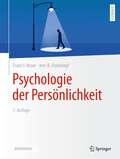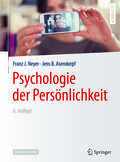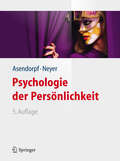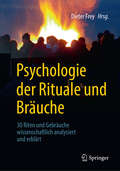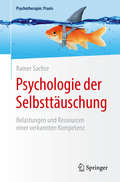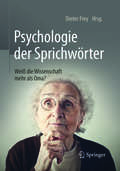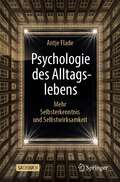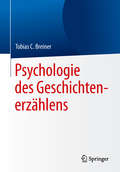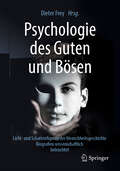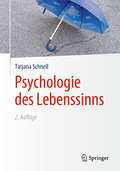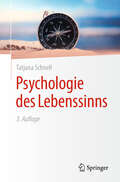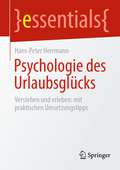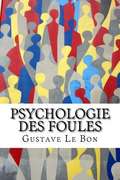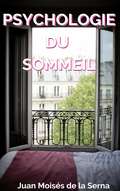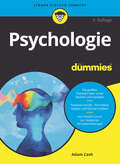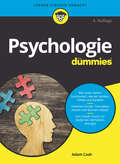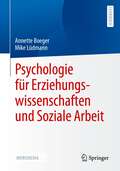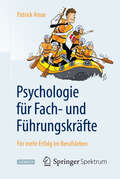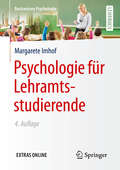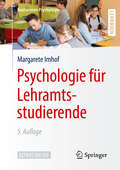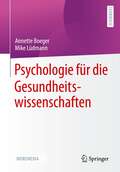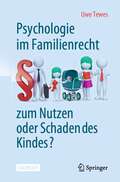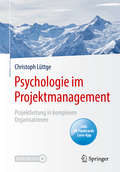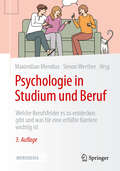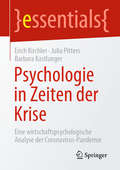- Table View
- List View
Psychologie der Persönlichkeit
by Jens B. Asendorpf Franz J. NeyerDieser Lehrbuch-Klassiker der Differenziellen Psychologie und Persönlichkeitspsychologie bietet alles, was Studierende und Lehrende für das Studium benötigen: Das gesamte Prüfungswissen anschaulich und lernfreundlich aufbereitet, vielfältige Online-Zusatzmaterialien auf www.lehrbuch-psychologie.springer.com zum Lernen und Lehren und praxisnahe Bezüge zu Alltagsleben, Gesellschaft und Berufswelt. – Wer ist ein guter Partner? Wie wird interkulturelles Training gestaltet? Wie wirkt Selbstdarstellung in den neuen Medien? Was ist soziale Kompetenz? – Alles, was den Menschen ausmacht, finden Sie in diesem Buch!
Psychologie der Persönlichkeit (Springer-Lehrbuch)
by Jens B. Asendorpf Franz J. NeyerDie individuelle Besonderheit des Menschen steht im Zentrum des Fachgebiets Persönlichkeits- oder Differentielle Psychologie. In dem Band erläutern die Autoren systematisch Grundlagen und Anwendung: die sechs Paradigmen der Persönlichkeitspsychologie, Persönlichkeitsbereiche und Störungen, die Entwicklung der Persönlichkeit, Umwelt- und Beziehungsaspekte, kulturvergleichende Persönlichkeitspsychologie und Geschlechterunterschiede. Mit Merksätzen und Prüfungsfragen, deutsch-englischem Glossar und zusätzlichen Materialien auf der begleitenden Website.
Psychologie der Persönlichkeit (Springer-Lehrbuch)
by Jens B. Asendorpf Franz J. NeyerDie individuelle Besonderheit des Menschen steht im Zentrum des Fachgebiets Persönlichkeits- oder Differentielle Psychologie. In dem Band erläutern die Autoren systematisch Grundlagen und Anwendung: die sechs Paradigmen der Persönlichkeitspsychologie, Persönlichkeitsbereiche und Störungen, die Entwicklung der Persönlichkeit, Umwelt- und Beziehungsaspekte, kulturvergleichende Persönlichkeitspsychologie und Geschlechterunterschiede. Mit Merksätzen und Prüfungsfragen, deutsch-englischem Glossar und zusätzlichen Materialien auf der begleitenden Website.
Psychologie der Rituale und Bräuche: 30 Riten und Gebräuche wissenschaftlich analysiert und erklärt
by Dieter FreyDieses Buch betrachtet bekannte Rituale, Sitten und Bräuche des menschlichen Lebens aus psychologischer Perspektive: Welche neuen Erkenntnisse bietet die moderne Wissenschaft zu den teils uralten Ritualen unseres individuellen oder gesellschaftlichen Lebens, die uns Menschen bis heute beeinflussen? – Dazu stellen die Autoren den historischen Hintergründen neue, psychologische Erklärungen gegenüber und erweitern so unser Wissen darüber, warum es gewisse Bräuche gibt, welche Funktion sie für unser (Zusammen-)Leben erfüllen und warum sich manche Rituale nach wie vor erhalten haben oder im Laufe der Zeit aufgegeben oder modifiziert wurden. Darüber hinaus bietet das Buch erstaunliche Erkenntnisse über das Urteilen, Denken und Verhalten von Menschen und gibt ganz konkrete Tipps für unser Handeln – z.B. in der Erziehung in Kindergärten und Schulen, Führung in Unternehmen und der Politik oder unserem alltäglichen Leben.
Psychologie der Selbsttäuschung: Belastungen und Ressourcen einer verkannten Kompetenz (Psychotherapie: Praxis)
by Rainer SachseDieses gut lesbare Fachbuch für Psychotherapeuten und Berater klärt über ein verbreitetes Phänomen auf: Wir täuschen uns selbst, machen uns etwas vor, reden uns was ein. Die rosarote Brille hat etwas Schützendes. Selbsttäuschung trägt aber auch negative Kleider, z. B. wenn wir etwas glauben wollen, obwohl wir sehen, dass es den Fakten widerspricht. Dieses Buch zeigt auch, wie wir uns auf die Schliche kommen können und was wir davon haben, wenn wir uns mit dem Thema befassen bzw. wie wir unseren Patienten und Klienten dabei helfen können. Geschrieben für… … alle, (1) die in Therapie und Beratung selbst betroffen sind oder ihren Klienten und Patienten schneller und effektiver helfen möchten, (2) die selbst schon mal Fake News auf den Leim gegangen sind und sich für das Thema und für Persönlichkeitsentwicklung interessieren, (3) die notorische Selbsttäuscher verstehen und besser mit ihnen interagieren wollen. Der Autor: Prof. Dr. Rainer Sachse ist Psychologischer Psychotherapeut, Begründer der Klärungsorientierten Psychotherapie und Leiter des Instituts für Psychologische Psychotherapie (IPP) in Bochum. Er macht komplexe psychologische Sachverhalte allgemein verständlich und stellt sie humorvoll und einfühlsam dar.
Psychologie der Sprichwörter: Weiß die Wissenschaft mehr als Oma?
by Dieter FreyDieses Buch untersucht gängige Sprichwörter des Volksmunds aus psychologisch-wissenschaftlicher Perspektive: Stimmen die alten Sprichwörter mit den Erkenntnissen der modernen Wissenschaft überein? Weiß die Wissenschaft mehr oder gar weniger als Oma, die sich viele Zusammenhänge des alltäglichen Lebens durch "Lebensweisheiten" erklärte? 33 kompakte Kapitel beleuchten 33 bekannte Sprichwörter und erklären, was die Wissenschaft dazu weiß, unter welchen Bedingungen ein Sprichwort gilt und wo ggf. die Grenzen seiner Gültigkeit liegen. Ein Buch für Studierende und Dozierende der Psychologie, denn es bietet durch die Breite der Themen eine Übersicht über viele Phänomene und Theorien der Psychologie - gleichzeitig aber auch für interessierte Laien, die für Alltagsphänomene psychologische Erklärungen suchen.
Psychologie des Alltagslebens: Mehr Selbsterkenntnis und Selbstwirksamkeit
by Antje FladeDas alltägliche Verhalten des Menschen ist Struktur und Raum gleichzeitig: Warum handelt dieser Mensch gerade so und nicht anders? Warum ist mir die eine Person auf Anhieb sympathisch – die andere nicht? Warum lache ich eigentlich über diesen Witz? Und warum fühlt man sich in einem leeren Raum nicht so recht wohl, in dem normalerweise viele Menschen anwesend sind. Dieses Buch hilft Ihnen, solche psychologischen Phänomene zu durchschauen und sich damit in Ihrem Alltag besser zurechtzufinden. Antje Flade hat dazu 30 abwechslungsreiche Alltags-Geschichten („Psycho-Stories“) aus allen Lebensbereichen zusammengestellt, die Sie so oder so ähnlich sicher selbst schon erlebt haben.
Psychologie des Geschichtenerzählens
by Tobias C. BreinerIn diesem Buch geht es um die Psychologie guter Geschichten und deren Handlungsfiguren. Es beantwortet Fragen wie:Warum rühren uns manche Filme zu Tränen und andere lassen uns kalt?Warum fesseln uns manche Romane so, dass wir bis tief in die Nacht weiterlesen? Warum quälen wir uns dagegen durch manche Pflichtlektüre hindurch?Warum zocken wir manches Adventure-Game bis zum letzten Level während wir bei anderen schnell die Lust verlieren? Das Werk ist für all diejenigen verfasst, die sich in irgendeiner Weise mit der Erzeugung und Bewertung von Handlungen befassen. Sowohl Charakter- und Game-Designer profitieren durch neue archetypische Modelle und Psychologen können mit der hier präsentierten dodekazyklischen Heldenreise innovative therapeutische Methoden entwickeln. Roman- und Drehbuchautoren bekommen eine Blaupause für erfolgsversprechende Geschichten, die sich auch auf das Interactive Storytelling übertragen lässt und Regisseure sowie Film-, Computerspiel- und Literaturkritiker erhalten durch den Inhalt des Werkes gezielte Bewertungskriterien.
Psychologie des Guten und Bösen: Licht- und Schattenfiguren der Menschheitsgeschichte - Biografien wissenschaftlich beleuchtet
by Dieter FreyWarum gibt es das Böse in der Welt, das uns zur Verzweiflung bringt? Und warum andererseits das Gute, das die Welt zum Positiven verändert? Dieses Buch nähert sich dem Phänomen von Gut und Böse in Gestalt ganz konkreter, bekannter Personen der Menschheitsgeschichte und versucht zu erklären: Warum gehören sie zu den Bösen oder Guten? Was hat sie geprägt? Was waren Ursachen und Auslöser für ihre Taten? Was bedeutet dies für unsere heutige Zeit? Die Antworten auf diese Fragen werden dabei aus der Wissenschaft und vor allem aus der (Sozial-)Psychologie abgeleitet. Damit liest sich dieses Werk gleichzeitig als lebensnahes Psychologielehrbuch wie auch als Biografie berühmter Personen, die uns seit jeher – im Guten wie im Schlechten – faszinieren.
Psychologie des Lebenssinns
by Tatjana SchnellIn diesem anregenden Fachbuch werden aktuelle wissenschaftliche Erkenntnisse zum Thema Lebenssinn greifbar und in der Praxis nutzbar. Auf der Grundlage empirischer Forschungsergebnisse erfahren die Leserinnen und Leser, welche Dimensionen von Sinn es gibt und wie man sie für sich bzw. für Klienten entdecken kann. Transdisziplinär gewonnene Einsichten zu Sinn und Gesundheit sowie Sinn in der Arbeitswelt werden dargestellt. Der Einfluss gesellschaftlicher Entwicklungen auf die Sinnfrage wird diskutiert. Ergänzende philosophische und reflektierende Selbsterkundungen machen das Lesen zu einem Erlebnis – wenn es glückt: zu einem sinnhaften Erleben. Geschrieben für psychologische und ärztliche Psychotherapeuten, Psychiater, Psychologen, Pädagogen, Berater, Organisationsentwickler, Seelsorger, interessierte Laien. Aus dem Inhalt: Sinn suchen? – Sinn definieren – Zur Erfassung von Lebenssinn – Wie entsteht Sinn? – Sinnvariationen – Lebensbedeutungen: Quellen des Lebenssinns – Die soziale Dimension des Sinns – Sinnkrise – Existentielle Indifferenz – Sinn und Glück – Sinn, Gesundheit und Krankheit – Interventionen zur Stützung der Sinnhaftigkeit – Arbeit und Sinn. Die Autorin:Prof. Dr. Tatjana Schnell forscht und lehrt zum Thema Lebenssinn am Institut für Psychologie der Universität Innsbruck (Ö) und der MF Specialized University, Oslo (NO). Auf www.sinnforschung.org geben sie und ihr Team allgemeinverständliche Einblicke in die internationale Sinnforschung.
Psychologie des Lebenssinns
by Tatjana SchnellIn diesem anregenden Fachbuch werden aktuelle wissenschaftliche Erkenntnisse zum Thema Lebenssinn greifbar und in der Praxis nutzbar. Auf Grundlage empirischer Forschungsergebnisse erfahren Leserinnen und Leser, wie Sinn persönlich und beruflich entdeckt werden kann. Sinnentstehung und Sinnerfahrung werden beschrieben und im Kontext gesellschaftlicher Entwicklungen beleuchtet. Einsichten zu existenzieller Kommunikation, Sinn in Gesundheit und Arbeit bieten praktische Relevanz. Ergänzende philosophische und reflektierende Selbsterkundungen machen das Lesen zu einem Erlebnis – wenn es glückt: zu einer sinnhaften Erfahrung. Geschrieben für Fachkräfte in Psychotherapie, Psychiatrie, Medizin, Pädagogik, Beratung, Wirtschaft, Sozialarbeit, Seelsorge, für Forschung und (Selbst-)Studium. Aus dem Inhalt: Sinn suchen? – Sinn definieren – Zur Erfassung von Lebenssinn – Wie entsteht Sinn? – Lebensbedeutungen: Quellen des Lebenssinns – Sinnvariationen – Sinn und Weltanschauung – Die soziale Dimension des Lebenssinns – Sinnkrise – Existenzielle Indifferenz – Sinn und Glück – Sinn, Gesundheit und Krankheit – Sinn und Existenz in der Praxis – Arbeit und Sinn. Die Autorin: Tatjana Schnell ist Professorin für Existenzielle Psychologie an der MF Specialized University in Oslo, Norwegen, und Fellow an der Humanistischen Hochschule Berlin. Seit über 20 Jahren erforscht sie die Frage nach dem Sinn: im Leben, in der Arbeit, in Krisenzeiten. Sie ist Direktorin des Existential Psychology Lab und gründete die Plattform Sinnmacher.
Psychologie des Urlaubsglücks: Verstehen und erleben: mit praktischen Umsetzungstipps (essentials)
by Hans-Peter HerrmannMenschen streben beständig nach Glück. Diese Thematik nimmt über die gesamte Lebensspanne eine zentrale Bedeutung ein. Neben Jobglück gibt es auch ein Urlaubsglück. Diesem Thema widmet sich dieses essential und geht u.a. folgenden Fragen nach: Was ist Urlaubsglück?Gibt es einen Zusammenhang von Reisemotiven und Glücksgefühlen?Wie lassen sich richtige Reiseentscheidungen treffen?Wodurch entsteht Urlaubsstress?Was ist unter einem Flow-Erleben zu verstehen?Sie erhalten dazu Anregungen und praktische Tipps, um Ihrem Urlaubsglück ein Stück näher zu kommen. Zielgruppen:Glück- und Erholungssuchende, Interessierende Reisende, Reisemittler/Reiseberater, Reiseveranstalter, Touristische Leistungsträger (Hotels, Verkehrsträger, etc.), Feriendestinationen
Psychologie des foules
by Gustave Le BonGustave Le Bon (1841-1931) eut un immense succes et inspira jusqu'a Freud. Veritable best-seller, Psychologie des Foules est considere comme un des livres qui ont change le monde au debut du XXe siecle. Monument historique, il demeure une uvre pionniere de la psychologie sociale et la premiere a interroger brillamment le phenomene de masse qui allait tourmenter le XXe siecle. Moscovici le considere comme le Machiavel des societes de masses qui, le premier, aura compris l'importance du role (potentiellement destructeur) des foules. Ce livre est devenu un classique incontournable pour tous les sociologues et psychologues. Texte integral et conforme a l'edition originale de 1895 (version 1. 1 corrigee). "
Psychologie du Sommeil
by Juan Moises de la SernaCet ebook parle de l'importance du sommeil, en particulier pour la santé mentale, ainsi que les problèmes associés à l'insomnie. Par-dessus tout, il présente les dernières techniques pour le surmonter. Tout le monde, à un moment donné de sa vie, a eu des problèmes qui l'ont «mis au lit» et qui lui ont empêché de dormir. Dans cet ebook, nous essayons d'offrir d'une manière simple les résultats des dernières recherches sur ce sujet afin que vous puissiez apprendre à améliorer la qualité de votre sommeil et ainsi avoir une vie plus épanouie. Un ebook conçu spécialement pour vous aider à dormir paisiblement durant vos 8 heures de sommeil quotidien.
Psychologie für Dummies (Für Dummies)
by Adam CashPsychologie ist viel mehr als Freud und Co.: Welche Rolle spielt die Biologie? Was bewirken Emotionen und wie kann man sie messen? Welche Faktoren bedingen Verhaltensänderungen? Was motiviert einen Menschen, extreme Dinge zu tun? Und ab wann gilt jemand als psychisch krank? Adam Cash geht all diesen Fragen nach und gibt Ihnen Einblick in die verschiedenen Forschungsbereiche, in denen Psychologen tätig sind: Kognitive Psychologie, Entwicklungspsychologie, Sozialpsychologie, Persönlichkeitspsychologie, Forensische und Klinische Psychologie. Auch moderne Therapieformen kommen nicht zu kurz.
Psychologie für Dummies: Dem Menschlichen Fühlen, Denken Und Verhalten Auf Der Spur (Für Dummies)
by Adam CashWenn Sie großes Interesse an Menschen und ihrem Verhalten haben, sich aber nicht für lange Abhandlungen und Fachchinesisch erwärmen können, sollten Sie »Psychologie für Dummies« lesen. Denn Psychologie ist viel mehr als Freud und Co.: Was motiviert einen Menschen, extreme Dinge zu tun? Welche Rolle spielt die Biologie? Was bewirken Emotionen und wie kann man sie messen? Welche Faktoren bedingen Verhaltensänderungen? Und ab wann gilt jemand als psychisch krank? Adam Cash geht all diesen Fragen nach und gibt Ihnen Einblick in die verschiedenen Forschungsbereiche, in denen Psychologen tätig sind: Kognitive Psychologie, Entwicklungspsychologie, Sozialpsychologie, Persönlichkeitspsychologie, Forensische und Klinische Psychologie. Sie erhalten einen ganz neuen Zugang zu menschlichem Verhalten, Gefühlen und Abnormitäten.
Psychologie für Erziehungswissenschaften und Soziale Arbeit
by Mike Lüdmann Annette BoegerDieses Lehrbuch vermittelt die relevanten Grundlagen der Psychologie für die Studiengänge Erziehungswissenschaften / Pädagogik sowie Soziale Arbeit. Denn Erkenntnisse der Psychologie sind eine wichtige Grundlage für die Arbeit im psychosozialen Arbeitsfeld: Sie fördern das Verständnis für menschliches Verhalten und geben praktische Hilfen für den Umgang mit Menschen an die Hand. Und so spielen sie bereits im Studium eine wichtige Rolle. Die Autoren bringen ihre langjährige Erfahrung in der psychologischen Lehre für „Psychologiestudierende im Nebenfach“ ein und vermitteln die Inhalte kurzweilig und didaktisch aufgelockert - mit vielen Beispielen, Abbildungen, Übungen, Lernfragen, Cartoons etc. „Trockene Theorie“ wird regelmäßig mit Alltagsfragen aus dem Berufsleben verknüpft. Auf einer Begleitwebsite auf lehrbuch-psychologie.springer.com finden sich zusätzliche kostenlose Lernmaterialien wie ein Glossar, Lernkarten und Verständnisfragen.
Psychologie für Fach- und Führungskräfte: Für mehr Erfolg im Berufsleben
by Jutta Bretthauer Patrick AmarKonzepte und Themen wie positives Denken, Abwehrmechanismen, emotionelle Intelligenz, Überzeugungskommunikation, kognitive Dissonanz, Commitment-, Motivations- und Leadershiptheorien, interkulturelle Unterschiede, Stress und Work-Life-Balance beruhen alle auf zentralen psychologischen Theorien. Psychologie und Management sind eng miteinander verflochten. Die Psychologie stellt Unternehmen einen reichhaltigen Schatz an empirischen Erkenntnissen zur Verfügung, die die Managementtheorien gut ergänzen. Ausgehend von grundlegenden Experimenten aus den Gebieten der klinischen Psychologie, sowie der Sozial- und Organisationspsychologie zeigt Patrick Amar in diesem Werk Konzepte und Tools auf, die die Managementpraxis erklären, ergänzen und erweitern. Darüber hinaus gibt dieses Werk derzeitigen und zukünftigen Führungskräften wertvolle Impulse zur persönlichen und professionellen Weiterentwicklung und ist somit eine Pflichtlektüre für alle, die ihre ganz persönliche Work-Life Balance anstreben.
Psychologie für Lehramtsstudierende
by Margarete ImhofLehrerinnen und Lehrer treffen täglich wichtige Entscheidungen: Wie soll Lernen gestaltet werden? Ist Gruppenarbeit wirklich sinnvoll? Wie erkennt und fördert man individuelle Potentiale? Psychologische Kenntnisse können bei diesen und vielen anderen Fragen eine wichtige Entscheidungshilfe sein. Zukünftigen Lehrerinnen und Lehrern bietet dieses Buch eine verständliche, praxisnahe Einführung in die Pädagogische Psychologie, angereichert mit zahlreichen Beispielen und Fällen aus Schule und Unterricht.
Psychologie für Lehramtsstudierende (Basiswissen Psychologie)
by Margarete ImhofZukünftigen Lehrerinnen und Lehrern bietet dieses Buch eine verständliche, praxisnahe Einführung in die Psychologie der Entwicklung, des Lernens und des sozialen Verhaltens. Damit liefert es zum einen eine Einführung in das fürs Lehramtsstudium nötige psychologische Wissen – und zum anderen wichtige Grundlagen für die praktischen Entscheidungen, die Lehrende täglich treffen müssen, u.a.: Wie soll Lernen besser gestaltet werden? Wie erkennt und fördert man individuelle Potentiale? – Mit zahlreichen Beispielen und realitätsnahen Fällen aus Schule und Unterricht.
Psychologie für die Gesundheitswissenschaften
by Mike Lüdmann Annette BoegerDieses Lehrbuch vermittelt die relevanten Grundlagen der Psychologie für das Studium der Gesundheits- und Pflegewissenschaften. Denn Erkenntnisse der Psychologie sind eine wichtige Basis für die Arbeit in verschiedenen Gesundheitsberufen: Sie fördern das Verständnis für menschliches Verhalten und geben praktische Hilfen für den Umgang mit Menschen an die Hand. Und so spielen sie bereits im Studium eine wichtige Rolle. Die Autoren bringen ihre langjährige Erfahrung in der psychologischen Lehre für „Psychologiestudierende im Nebenfach“ ein und vermitteln die Inhalte kurzweilig und didaktisch aufgelockert - mit vielen Beispielen, Abbildungen, Übungen, Lernfragen, Cartoons etc. „Trockene Theorie“ wird regelmäßig mit Alltagsfragen aus dem Berufsleben verknüpft. Auf einer Begleitwebsite auf lehrbuch-psychologie.springer.com finden sich zusätzliche kostenlose Lernmaterialien wie ein Glossar, Lernkarten und Verständnisfragen.
Psychologie im Familienrecht - zum Nutzen oder Schaden des Kindes?
by Uwe TewesDieses lebenspraktische Sachbuch greift die öffentliche Diskussion über Ungerechtigkeiten im Scheidungsverfahren, gerichtliche Fehlurteile und familienpsychologische Gutachter als „heimliche Richter“ auf. Es beschreibt anschaulich das sehr komplexe System der Zusammenarbeit von Gerichten, Gutachtern, Anwälten, Jugendämtern und Verfahrensbeiständen der Kinder und befasst sich insbesondere mit der Arbeit der psychologischen Sachverständigen.Mit Hinweisen auf fragwürdige Methoden und häufige Fehlerquellen regt dieses Werk auch zum Mitdenken an und ist sowohl ein Plädoyer für ein gesundes Maß an Psychologie im Familienrecht wie auch eine Warnung vor einer Psychologisierung des Gerichtsverfahrens.Zielgruppen für dieses Buch sind Eltern und Betroffene, Juristen und andere beteiligte Professionen sowie psychologische Laien mit einem Interesse an dieser Thematik.Diese vollständig überarbeitete und aktualisierte Neuauflage berücksichtigt die zahlreichen Empfehlungen, Richtlinien, Mindestanforderungen der Fachgesellschaften und der neueren Fachbücher, die seit der Erstauflage erschienen sind.Zum Autor Universitäts-Professor und Diplom-Psychologe (i.R.) Dr. Uwe Tewes war Leiter des Instituts für Medizinische Psychologie an der Medizinischen Hochschule Hannover und mehr als vier Jahrzehnte nebenamtlich als forensischer Gutachter tätig.
Psychologie im Projektmanagement: Projektleitung in komplexen Organisationen
by Christoph LüttgeSie leiten ein komplexes Projekt, wenden SCRUM und agile Managementmethoden an, machen auch sonst alles richtig und trotzdem gibt es Unzufriedenheit unter den Stakeholdern? Dieses Fachbuch über Projektmanagement bietet Ihnen praxistaugliche Lösungen zu Vertrauensbildung und Motivation und führt Sie dabei in einmaliger Weise durch die psychologischen Untiefen von Risiken und Krisen sicher zum Erfolg. Von theoretischen Fundamenten wie der Motivations-, Organisations- und Kommunikationspsychologie wird der Bogen zum unternehmenspolitischen Umfeld gespannt, in dem Sie sich als Projektleitung bewegen. Aus seiner eigenen, über 25-jährigen Projekterfahrung reichert der Autor jedes Thema mit Darstellungen konkreter Managementsituationen aus der Praxis an, in denen Sie sich wiederfinden werden. Fragen und Antworten zum Selbsttest sind über die Flashcard App inkludiert. Ihren persönlichen Code finden Sie im Buch. Zielgruppen: Das Buch wendet sich an Projektleitungen und Führungskräfte, an Neueinsteiger genauso wie an erfahrene Profis, die kontinuierlich ihren Führungsstil weiterentwickeln wollen.
Psychologie in Studium und Beruf: Welche Berufsfelder es zu entdecken gibt und was für eine erfüllte Karriere wichtig ist
by Simon Werther Maximilian MendiusDieses Buch nimmt Sie mit auf eine faszinierende Reise durch die vielfältigen Tätigkeitsfelder von Psycholog:innen. Dabei lernen Sie neben den etablierten Anwendungsgebieten wie klinische Psychologie und Wirtschaftspsychologie auch vermeintlich exotische Arbeitsfelder wie Polizei- oder Verkehrspsychologie oder Data Science kennen. Finden Sie für sich heraus, ob und für welche Tätigkeit in der Psychologie Ihr Herz schlägt und wie Sie diesen Wunsch verwirklichen können. Alle Kapitel sind von erfahrenen Expert:innen aus der Praxis verfasst. Sie vermitteln Ihnen einen sowohl authentischen als auch realistischen Einblick in den jeweiligen Berufsalltag und räumen auf mit gängigen Vorurteilen. Darüber hinaus eröffnen eingeflochtene Interviews mit praktisch tätigen Psycholog:innen und Expert:innen aus der Wissenschaft bereichernde Perspektiven. In dieser Neuauflage von Faszination Psychologie – Berufsfelder und Karrierewege haben wir zudem exklusive Webinhalte ergänzt, wo Sie in spannenden Formaten weitere relevante Einblicke gewinnen können.
Psychologie in Zeiten der Krise: Eine wirtschaftspsychologische Analyse der Coronavirus-Pandemie (essentials)
by Erich Kirchler Julia Pitters Barbara KastlungerAls uns das Virus SARS-CoV-2 in Europa erreichte, gerieten wir in Panik. Das Leben wurde auf das Notwendigste heruntergefahren und zaghaft wieder gelockert. Dem Lockdown folgen gewaltige Veränderungen. Die Rückkehr in die bekannte Normalität ist nicht in Sicht. Wie erlebten wir die Bedrohung unserer Gesundheit und die Veränderungen der gewohnten Lebensrituale? Was folgte auf Schock und Angst? Wie gelang es, lang eingeübte Rituale abzulegen und die Herausforderungen anzunehmen? Wie werden wir nach dem Lockdown über die politischen Maßnahmen reden, woran werden wir uns erinnern und was werden wir aus der Krise gelernt haben? Dieses Essential bietet eine wirtschaftspsychologische Analyse über das komplexe Zusammenspiel zwischen Staat, Organisationen und Menschen vom Beginn der Krise bis zur Reparaturphase.
